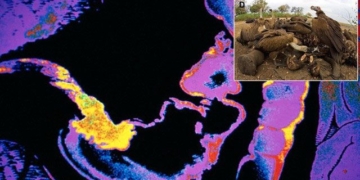Sore throat accompanied by swollen lymph nodes is often a sign of various infections such as the common cold, flu, measles, or tonsillitis.
Top 10 Common Causes of Sore Throat with Swollen Lymph Nodes
Sore throat and swollen lymph nodes are very common conditions that often occur together. This is because if you’re experiencing a sore throat, it’s likely that you have an infection and the lymph nodes are responding.
The nose and throat are among the primary entry points for germs into the body. As a result, these areas are frequently subject to mild infections. In such cases, the body responds by producing and sending white blood cells to destroy the germs. Swollen lymph nodes occur when they are filled with white blood cells.

Many infectious diseases can cause a sore throat and swollen lymph nodes. (Image: Emedihealth).
The body has about 600 lymph nodes. They often swell near any part of the body that is sick or injured. Below are some common causes that may lead to a sore throat and swollen lymph nodes.
Common Cold
According to Healthline, the common cold is an upper respiratory infection. Along with a sore throat, it can cause symptoms like a runny nose, fever, congestion, and cough. Children are more likely to catch colds, but adults can also experience them several times a year.
Colds are caused by viruses and therefore cannot be treated with antibiotics. Adults can use over-the-counter (OTC) medications to manage symptoms, but most cold medications are not safe for infants.
Colds are not dangerous unless you experience serious complications, such as difficulty swallowing or breathing. Call a doctor if your cold causes breathing difficulties or if you have other severe symptoms like a sore throat, sinus pain, or earache.
Flu
Similar to a cold, the flu is a viral respiratory infection. The flu virus differs from the virus that causes a common cold. However, their symptoms are almost identical. Typically, flu symptoms develop more suddenly and are more severe.
Individuals at risk for flu complications include young children, the elderly, and anyone with chronic illnesses that weaken the immune system. If you develop flu symptoms and are at risk for complications, contact your doctor immediately. Rarely, the flu can lead to serious health issues and even death.

Sore throat, swollen lymph nodes, coughing, or sneezing are typical symptoms of the flu or common cold. (Image: Medicalnewstoday).
Tonsillitis
The most common bacterial infection of the throat is strep throat, caused by the bacterium Streptococcus pyogenes. Strep throat can be difficult to distinguish from a cold.
If you have a severe sore throat and fever, see a doctor for urgent diagnosis and treatment. Strep throat is treated with antibiotics.
Measles
Measles is a viral infection that is more common in children than adults. Symptoms include fever, dry cough, sore throat, swollen lymph nodes, and a characteristic rash. Measles is usually preventable with vaccination. This disease requires treatment by a specialist as it can lead to severe complications.
Tonsillitis
Any inflammation of the tonsils, whether due to a virus or bacteria, is referred to as tonsillitis. You have several tonsils that form a ring around the mouth and upper throat area. Their components react quickly to any germs that invade the nose or mouth.
If your tonsils are causing pain or swelling that makes it difficult for you to breathe, seek emergency medical help. Viral tonsillitis can often be treated at home with plenty of fluids, rest, and pain relief medications.
Ear Infection
Sore throat, swollen lymph nodes in the neck, and ear infections often occur together. This is because a sore throat and nasal congestion can lead to or be related to an ear infection. Another reason is that ear infections can cause the glands to swell, and the pain can easily radiate down to the throat and mouth.
While ear infections are usually not serious, severe cases can lead to long-term issues such as brain damage and hearing loss.

Sore throat, swollen lymph nodes, and ear infections are symptoms that often accompany each other. (Image: Usatoday).
Dental Infection
Similar to ear infections, the location and presence of an infection in the teeth can cause a sore throat and swollen lymph nodes. Lymph nodes may swell when teeth are erupting, and you may feel pain throughout your mouth and throat.
Infected teeth require urgent medical care to prevent serious complications, and oral health is crucial for daily life.
Injury
Sometimes a sore throat is not due to illness but rather an injury. The glands may still swell as the body heals itself. Causes of throat injury include:
- Talking too much.
- Heartburn.
- Gastroesophageal reflux disease (GERD).
See a doctor if you experience severe pain or any difficulties in daily life due to your sore throat.
Lymphoma or HIV
Rarely, sore throat and swollen lymph nodes are signs of something very serious. For example, they may be symptoms of cancer such as lymphoma, or even a solid cancerous tumor that later spreads to the lymphatic system.
They may also be symptoms of the Human Immunodeficiency Virus (HIV). Symptoms in infected individuals can resemble those of the above conditions but often come with rare signs such as night sweats, unexplained weight loss, and other infections.



















































